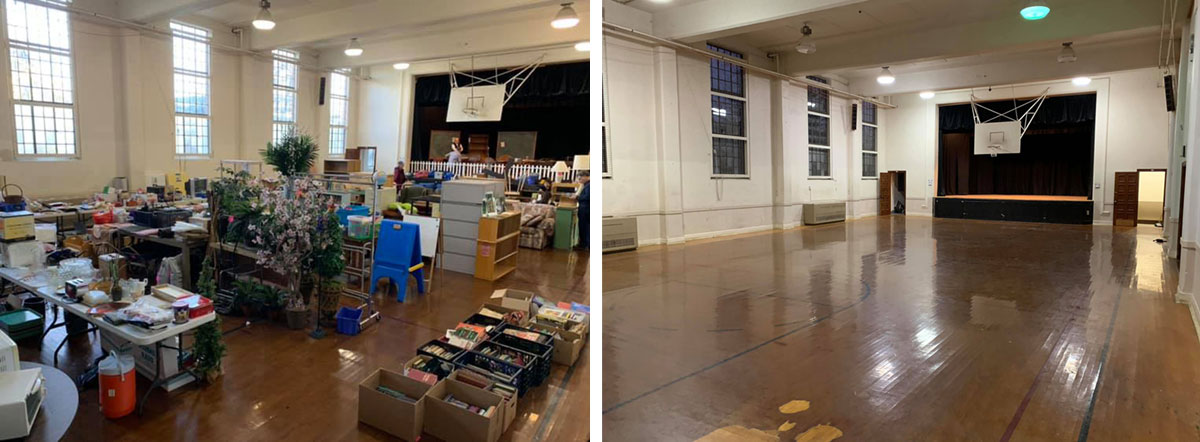KonMari for Ministry with the Multitudes

CrossOver reflection for Week Ten • Beginning February 3, 2019
We Make the Road by Walking, Chapter 23
Marie Kuch-Stanovsky
Standing in the laundry room, I take each unmatched sock into my hand. “Thank you… thank you…” I mutter gratitude to each as I place it in the donation bin.
January was a month of huge transitions, both for my church
A Japanese native, Kondo introduced her KonMari method of de-cluttering to a US audience in 2014 with a New York Times bestselling book. In January her new Netflix show went viral and Marie Kondo’s reach expanded to the multitudes, helping so many shed their clutter that thrift stores around the country have seen a significant uptick in donations.
Kondo uses deliberate process, gratitude, and ritual to help people keep what “sparks joy” and let go of what prevents them from living examined, meaningful lives. (I would directly quote Kondo here, but I gave away her book last week.) It is easy to become numb to the detritus we accumulate in our consumerist culture. The KonMari practice awakens us to release the glut and the guilt that so often lead us to keep unnecessary items.
KonMari found its way into this reflection because I was inspired by the stories of Jesus ministering to the multitudes; time and again contradicting the custom of his time to impact lives; letting go of the religious laws that might have prevented his ministry. I hope that we as a church might let go of what is keeping us from living into Jesus’ example. McLaren notes that “In addressing the social realities of his day, Jesus constantly turned the normal dominance pyramid on its head…” Kondo offers modern tools that can literally be applied in our time and place to work toward the equity Jesus preached and practiced.
At Trinity UMC each week we ask God to help us “discover how much is enough for us to be truly fulfilled, neither rich nor poor, and to consume only that.” With this prayer, we pledge to align our hearts and actions with Jesus’ example. As a
Our prayer of dedication continues with a pledge, to discover “how much would be enough for everyone not just to survive but to thrive, and to find ways for all to have access to that.” Rather than spend millions on renovations and upgrades for a vast space that we don’t need, we chose to invest our love, energy, and resources to continue serving the community. When we push back against consumerism, we begin to undermine the violent social and economic structures that enrich few through the pain of many.
Now that we have left so much behind, it is beginning to dawn on me that we might have more than we did before. By turning away from what dominant culture tells us to want, will we free ourselves to serve God more fully—to be “Alive in the Adventure of Jesus”?
*Used, single socks, I’ll admit, aren’t the most useful items to donate. Some thrift stores, including my local Goodwill, accept all garments of any condition to be recycled or repurposed.
Marie Kuch-Stanovsky is the head of the PNW delegation to the 2019 General Conference and serves on the Rules Committee of the Commission on General Conference. She is the interim Campus Minister at the Wesley Club in Bellingham, Washington and the coordinator of Fossil Free UMC, as well as a designer and letterpress printer.
Ann Lantz
Thank you for your reflection! In cold weather areas we welcome mismatched socks! When it comes to warmth, it doesn’t matter if socks match. We also have a lot of folks who use multiple pairs of mismatched socks to keep their hands warm!
Marilyn White
At age 85 years, I should have started this process years ago. Thank you for this timely suggestion.
Michael Kroth
Ironically, Diana Butler Bass wrote from the same author in her insightful newsletter essay, An Untidy Faith. There she talks what to keep and what to let go from a faith perspective. Instead of “keeping the faith”, she says, she has resolved to “keep faith”.
Here, in this thoughtful piece, Reverend Kuch-Stanovsky talks about the difficulty and yet the greater good that can come from “letting go”. I think it’s hard to discern the best path sometimes. What will best serve the pursuit of spiritual formation, community, and service? A building? Certainly, at times.
Except when it’s not.
What should we “keep” and is what we keep, keeping us?
My favorite lines from DBB’s essay, seem applicable here, and also for the upcoming GC. “I cannot testify to the life-changing magic of tidy closets. But I am certain that there is a deep mystery in the untidiness of faith. The more I keep, the clearer it seems to become – love and justice and goodness and kindness and mercy and gratefulness are wisdom we need right now to change the world. As for me, I keep faith.”
Rev. Laura Nicholson
Working in a clothing bank at a local Food Bank, we receive way too many miss-matched socks that no one ones wants… find a mechanic that wants rags as they need them, intact love them any clean rags. Also Goodwill is not a justice-serving industry, instead exploiting the ones they hire with less than minimum wages while making millions. The prices charged inside the Goodwill Stores attest to the fact they are not providing items at reduced prices where those less fortunate often turn for cheater clothing.
Instead check out Clothing banks such as Tacoma Community Services that offers clothing to those needing work clothes.
Leslie Ann Knight
This is a wonderful article, and good news about the Trinity UMC congregation, Marie.
Thank you.
Mary Huycke
thanks, Marie. Your reflections “sparked joy” in me!